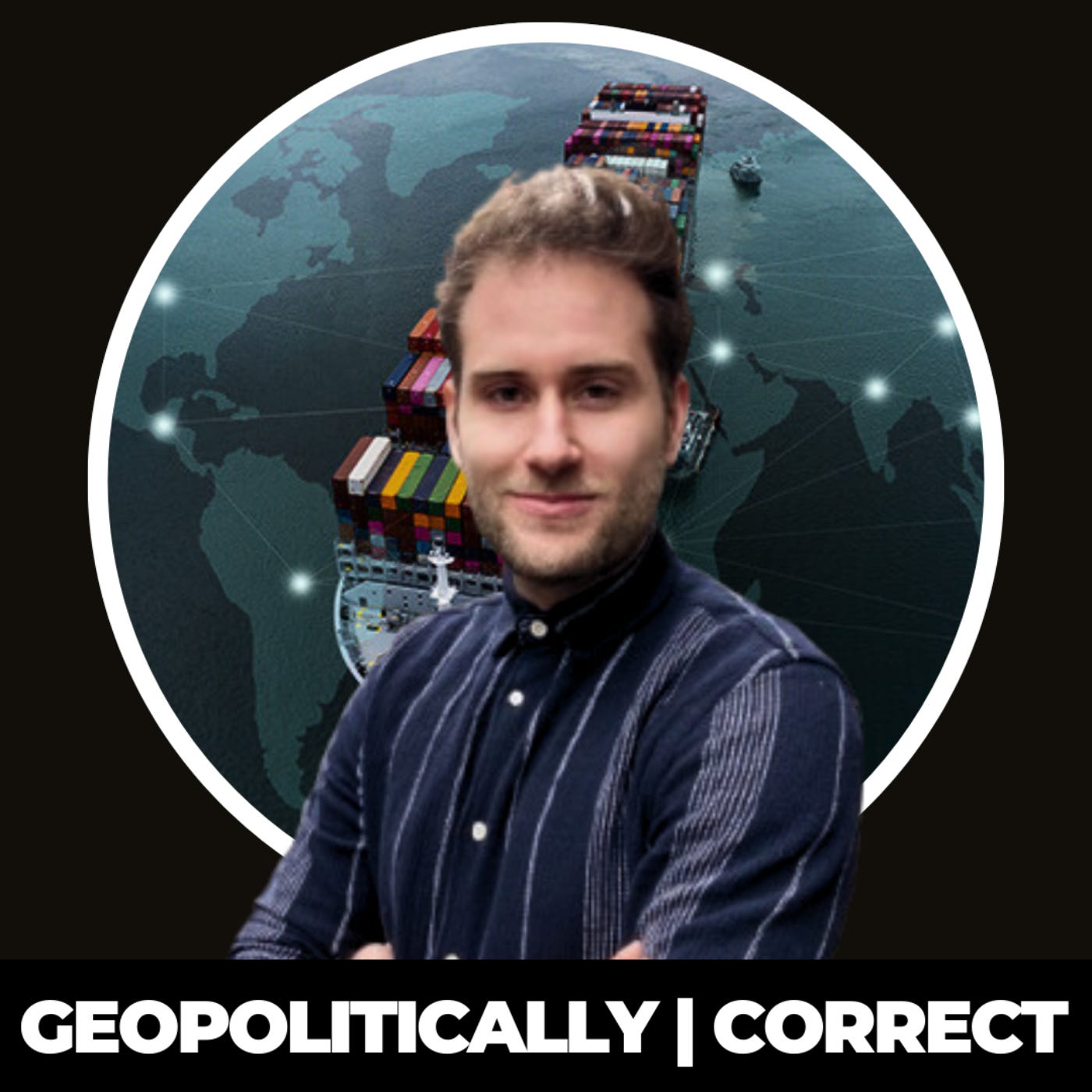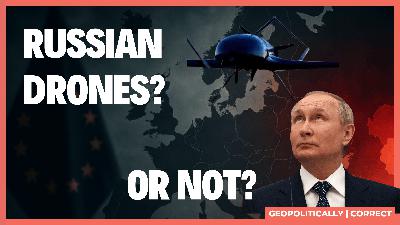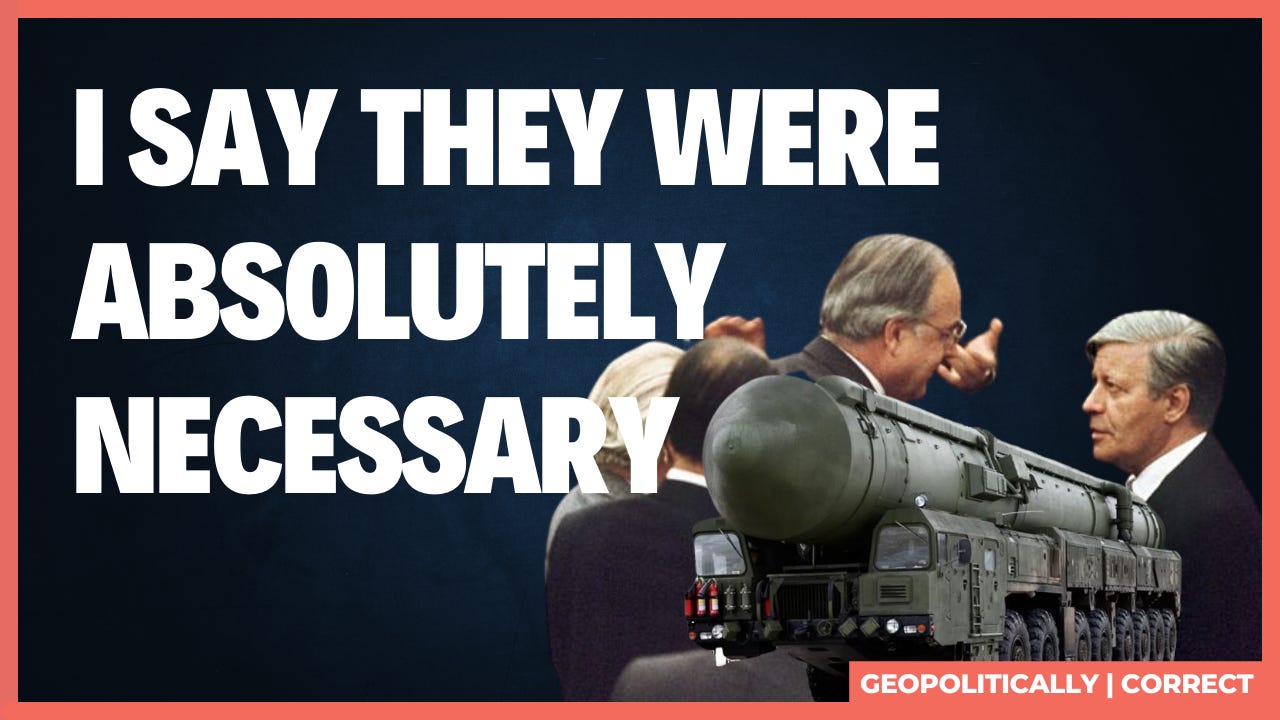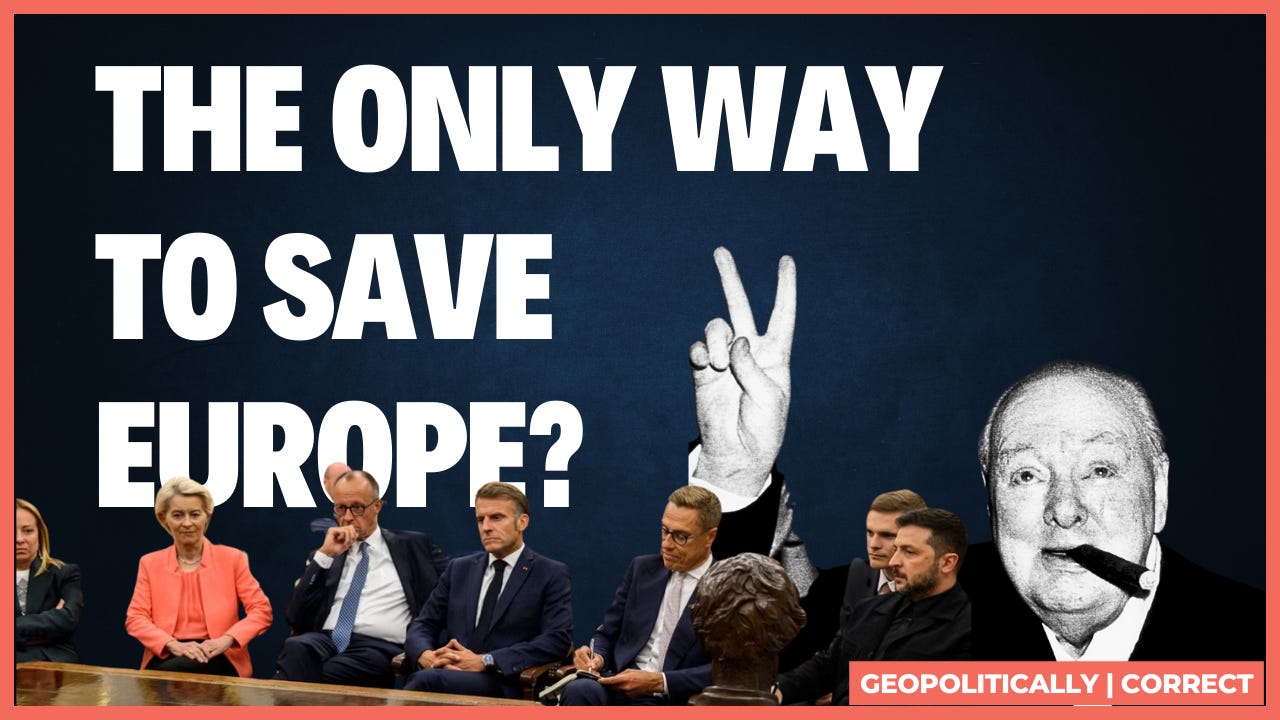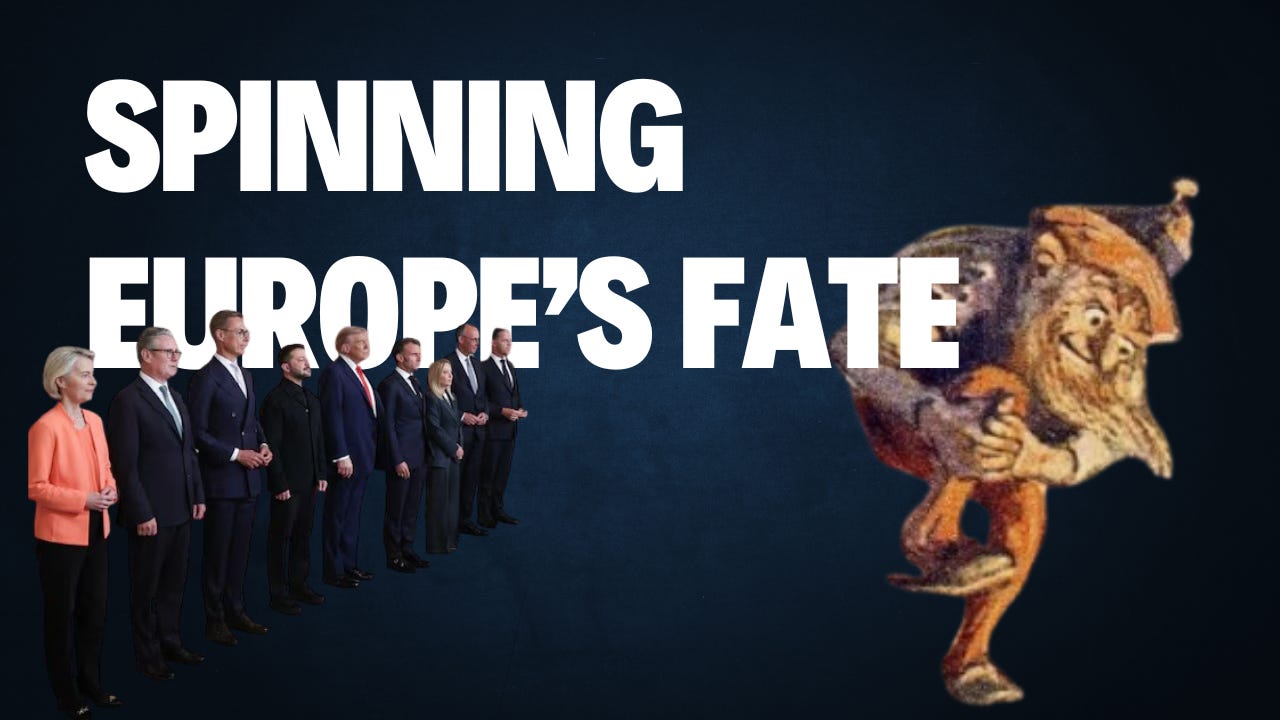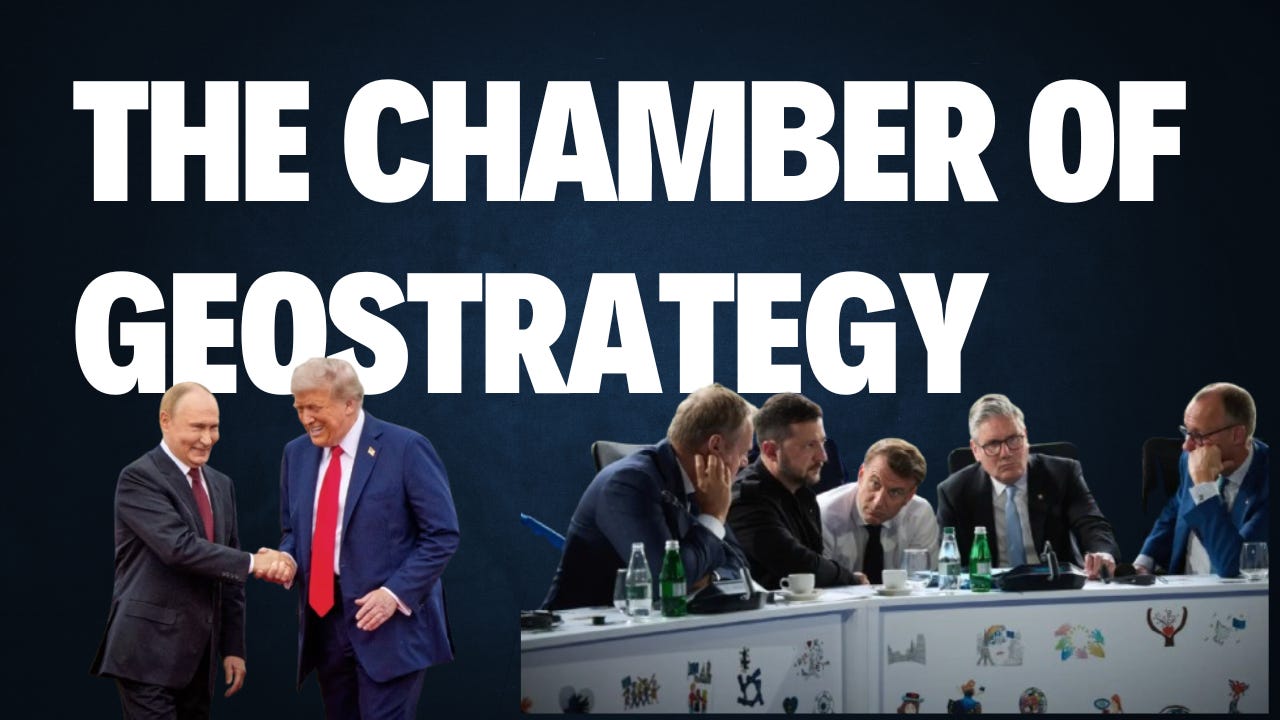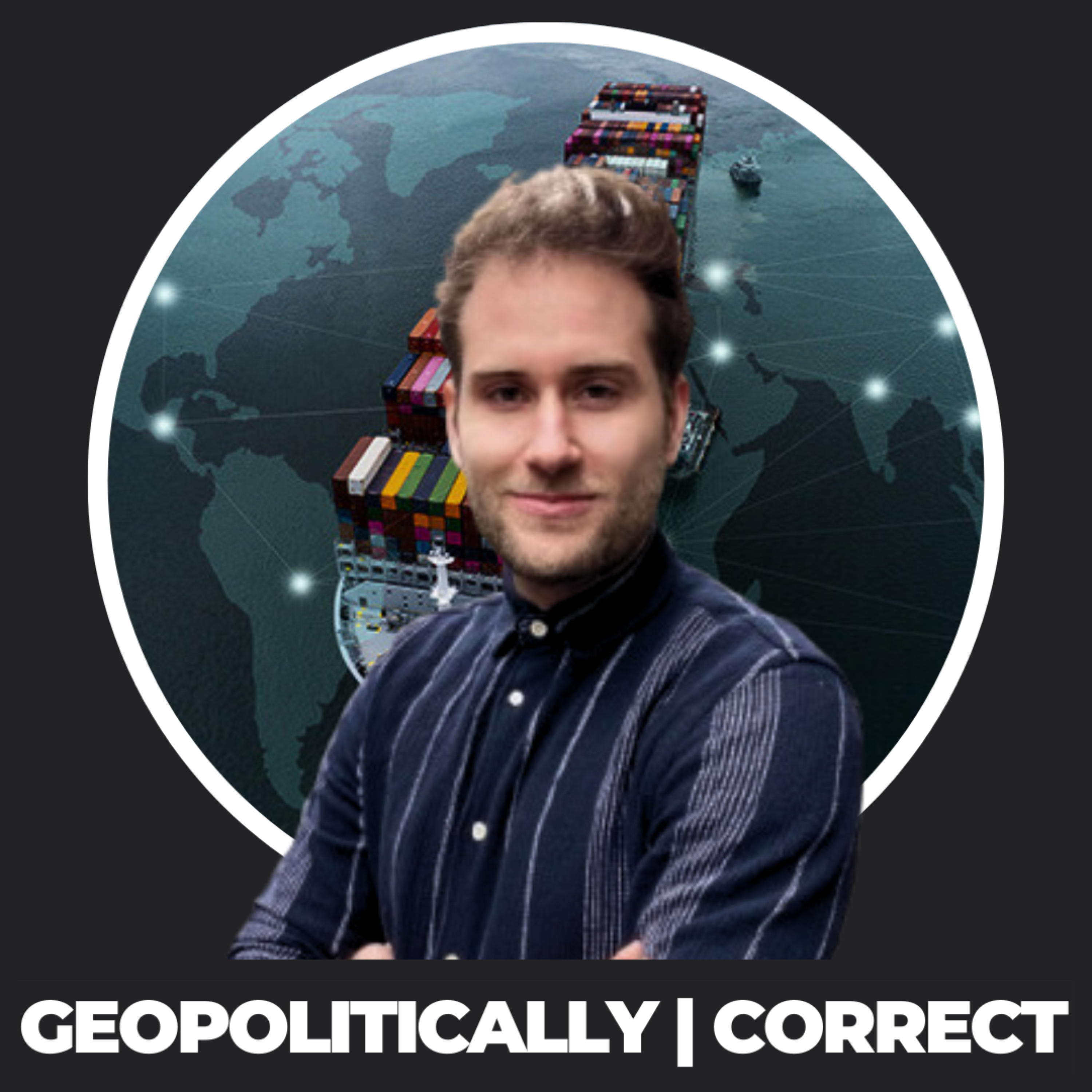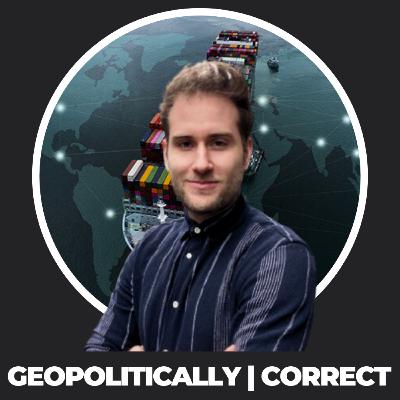Discover Geopolitically Correct
Geopolitically Correct

Geopolitically Correct
Author: Yannick Scheidegger
Subscribed: 0Played: 0Subscribe
Share
© Yannick Scheidegger
Description
Geopolitically Correct is a podcast on European geopolitics. We are politically non-partisan, but rely on reason, science, and humanism as our guiding principles. Subscribe to gain full access.
geopoliticallycorrect.substack.com
geopoliticallycorrect.substack.com
49 Episodes
Reverse
The EU’s differing threat perceptions have resulted in the adoption of moral narratives at the expense of strategic realism. Without a pragmatic approach Europe risks prolonging the war and speeding up its economic decline. But there is a way out of this. 🔔 Subscribe here on YouTube for more weekly analysis on European security, geopolitics, and strategy.Or Subscribe to my substack for free to get weekly updates on European geopolitics: To hear more, visit geopoliticallycorrect.substack.com
European states gave rise to one of the most important cultural and socio-political movements in Western civilization with the Enlightenment of the 18th century. From Sapere Aude’s call to “have the courage to use your own mind,” the idea arose in Europe that values, ideals, and rights such as human dignity and human rights, freedom and self-determination, and independence are universal in nature. This continues to shape the Western, and especially European, worldview and self-image to this day. But it is under external and internal pressure now. An external factor is Russia’s questioning of the European security order. The Russian Federation is working together with China on a new, in their words, “polycentric” world order.Internal pressure, on the other hand, comes from fundamentalist Islamic groups in Europe, as well as ideologies such as postmodern deconstructionists who contribute to the discrediting of the European way of life. Conservatives often blame the European Union for these problems. Some are calling for a return to the European model of nation states. In my view, this would be wrong. The nation states in Europe can no longer solve global and domestic challenges on their own.In the current situation, I see a federally organized Europe as a solution. This does not mean the formation of a European superstate, but rather a federation modeled on Switzerland.🔔 Subscribe for more weekly analysis on European security, geopolitics, and strategy. To hear more, visit geopoliticallycorrect.substack.com
How can Europe rebuild its internal strength in order to act more effectively on the world stage?Switzerland offers useful lessons. It started out as a loose confederation of self-governing communities. Over the centuries, it has learned to transform its differences into a strength by integrating regional differences within a single political framework.As European states search for a renewed strategic direction, they may find that the wisdom of the small is the key to their future.This episode shows what Europe can learn from Switzerland to (re)store its geopolitical strength.🔔 Subscribe for more weekly analysis on European security, geopolitics, and strategy. To hear more, visit geopoliticallycorrect.substack.com
Russian drones over Europe? In recent weeks, headlines have warned of violations in Poland, sightings in Norway and Denmark, and incidents in Germany and Estonia. But in geopolitics, the first suspect is not always the real culprit.In this analysis, we ask the key question: cui bono? Who truly benefits from these drone incidents?* We review the facts: Poland’s Article 4 consultations, airspace incidents in Northern Europe, and NATO responses.* We explore the beneficiaries: Russia, Ukraine, and other potential actors with an interest in destabilisation.* We assess the implications: what this means for Europe’s deterrence, dialogue and the future of cooperative security.The lesson is clear: escalation by reflex is not strategy. Europe must resist snap judgments, clarify the facts and practice what I call System-2 statecraft: deliberate, disciplined, and strategic.Watch next: 🔔 Subscribe for more weekly analysis on European security, geopolitics, and strategy.#Europe #Geopolitics #Security #Russia #NATO To hear more, visit geopoliticallycorrect.substack.com
Peace is never made only with friends. It is made with adversaries often bitter ones. Europe once knew this, but it has spent decades pretending otherwise. It told itself that history had ended in 1989, that commerce could replace strategy, that war belonged to another age.Today, Europe must learn once again that peace requires both strength and the willingness to speak to those it would rather shun. This tension between force and negotiation, hope and reality defines the current moment.🔔 Subscribe for weekly analysis on European geopolitics, security, and strategy. To hear more, visit geopoliticallycorrect.substack.com
In April, a photo from Marbella went viral: young people at a street café, drinking and smoking. The caption read: “The American mind can’t comprehend this.” For many Europeans, such scenes symbolise joie de vivre and the freedom to live as one chooses. In the United States, however, the image was mocked as proof of Europe’s lack of ambition and productivity. That criticism may contain some truth: this lifestyle is not guaranteed and could easily be lost. As Reinhart Koselleck observed in his notion of the “contemporaneity of the non-contemporaneous,” Europe still lives within the rules-based order of the past 80 years, even as other states reject and undermine it.Europe’s café culture and freedoms appear to be timeless, but are they really? In this video, I argue that they could disappear faster than many realise. What do you think? Is Europe’s way of life secure, or is it already slipping away?🔔 Subscribe for weekly analysis on European geopolitics, security, and strategy. To hear more, visit geopoliticallycorrect.substack.com
As tariffs return and great-power rivalry intensifies, can small states still stay afloat? This video looks at Switzerland’s strategic playbook from Marignano (1515) to Vienna (1815) and today’s “cooperative neutrality” to explain how a neutral country adapts in a multipolar, more transactional world. We unpack the politics behind sanctions on Russia, the debate over “neutrality carved in stone,” and Switzerland’s growing role in European security through PESCO, the European Sky Shield Initiative, PfP with NATO, and the upcoming OSCE Chairmanship in 2026.Chapters:00:00 Introduction: The Changing World Order01:05 Historical Context: Switzerland's Neutrality02:44 Modern Neutrality: Post-Cold War to Present06:11 Switzerland's Response to the Ukraine Conflict07:52 Debates and Future of Swiss Neutrality10:12 Switzerland's Role in European Security14:12 Conclusion: The Future of NeutralityTell me in the comments: Should Switzerland keep its neutrality as a foreign policy instrument? To hear more, visit geopoliticallycorrect.substack.com
On 8 December 1987, the US and the USSR signed the INF Treaty. This treaty reduced the nuclear threat to Europe by obliging both parties to destroy all nuclear weapons with a range between 500 and 5,500 kilometres, and to refrain from developing new missiles.Today, the task for European leaders is to understand how this breakthrough was achieved and what lessons can be learned for the current focus on ending the war in Ukraine.Read the Essay here: -- In Geopolitically Correct, I explore one strategic question each week. About Europe, power and what’s at stake. Subscribe now for free weekly updates. To hear more, visit geopoliticallycorrect.substack.com
Unus pro omnibus, omnes pro uno: one for all, all for one. In Switzerland, this saying is well known; it is the country’s unofficial motto.Europe would do well to live by it, too.Read the Essay here: https://geopoliticallycorrect.substack.com/p/unus-pro-omnibus-omnes-pro-uno--Support Geopolitically | Correct by becoming a subscriber:Get full access to Geopolitically | Correct at geopoliticallycorrect.substack.com/subscribe To hear more, visit geopoliticallycorrect.substack.com
In the Brothers Grimm fairy tale Rumpelstiltskin, the miller’s daughter is forced to make impossible deals, such as spinning straw into gold.Europe now finds itself in a similar situation.During meetings in Alaska and Washington, President Trump set out a fast-track plan for negotiations between Ukraine and Russia.But there are many obstacles ahead as the interests of Ukraine and Russia remain diametrically opposed.However, even the most challenging of dilemmas can be overcome. Today, it is up to diplomats to attempt the seemingly impossible.Read the Essay here: https://geopoliticallycorrect.substack.com/p/europes-rumpelstiltskin-moment--Support Geopolitically | Correct by becoming a subscriber: To hear more, visit geopoliticallycorrect.substack.com
The recent Trump–Putin meeting produced no concrete results and now, more than ever, Europe owns this war. Europeans must recognise that the United States will not take care of this problem for them. There is much European states can do, but first and foremost, geostrategic thinking must return to the forefront. In J. K. Rowling’s Harry Potter stories, the Chamber of Secrets hides a long-forgotten place of power. Europe has such a chamber too not one of monsters and magic, but of strategy. Keeping that chamber locked has consequences: while the American and Russian presidents meet in Alaska to discuss ending the largest war on European soil since 1945, Europe is once again left watching from the sidelines. Watch the full video for more.Read the Essay here: https://geopoliticallycorrect.substack.com/p/the-chamber-of-geostrategy --Support Geopolitically | Correct by becoming a subscriber: https://geopoliticallycorrect.substack.com/ To hear more, visit geopoliticallycorrect.substack.com
The recent outcome of the European Union’s trade negotiations with the United States regarding tariffs has some merit. It strengthens transatlantic ties, partly due to the EU’s commitment to purchasing hundreds of billions of dollars’ worth of US defence equipment and liquefied natural gas (LNG). From a European perspective, the US tariffs may appear unjust. But Washington continues to stand by its European partners.While the Trump administration pursues a clear America First agenda, the trade deal has to be seen as more of a recalibration within a functioning alliance.Read the Essay here: https://geopoliticallycorrect.substack.com/p/yes-the-west-is-stronger-now--Support Geopolitically | Correct by becoming a subscriber: https://geopoliticallycorrect.substack.com/ To hear more, visit geopoliticallycorrect.substack.com
“Autocracy is the way forward as the democracy experiment has failed (…) Let’s try something else (…) The only values Europe has are plunder and genocide! (…) Democracy is just an illusion. Taxation and debt slavery and politicians puppets of the elites.”These are some of the comments I received in responses to last weeks essay on Europe’s post-1989 failures and my argument to defend our Western or European values with diplomacy and hard power.These comments are a fringe part of the internet. But they also reflect a deep cynicism toward the political West and are connected to the discourse which is the growing disbelief in the value of the Western or European model.In geopolitics, this poses a danger because states must respond to changes in the international system. A state's strategic culture influences the way in which it responds to systemic factors coming from the international system.The strategic culture is not formed in isolation. It emerges from the beliefs of the public and in turn, conditions the choices available to political leaders. At a time when Europe faces a renewed threat from the East and a transactional partner in the West, nihilistic voices within the public discourse do real damage.In the political West and especially in Europe we must reclaim our geopolitical role. This means reclaim strenght — militarily, diplomatically and culturally.Read the Essay here: https://geopoliticallycorrect.substack.com/p/the-sleeping-beauty-european-geopolitics --Support Geopolitically | Correct by becoming a subscriber: https://geopoliticallycorrect.substack.com/ To hear more, visit geopoliticallycorrect.substack.com
Much has been written about the decline of the West in global power. Far less attention, however, has been paid to a parallel and equally consequential trend: as of 2024, for the first time in over two decades, the number of autocracies worldwide (91) exceeds the number of democracies (88).The picture becomes even more striking when viewed in terms of population. Today, 72% of the global population live under autocratic rule, while only 28% reside in democracies. That means 5.8 billion people now live in some form of autocracy — a record high. These figures raise the question: What happens when the Western model of liberal democracy is no longer the default setting of the international system?#democracy #autocracy #europe #valuesCONTENT:00:00 – Introduction: The Return of Autocracy 02:29 – The Hangover of the 1990s 03:20 – The End of Normative Power 04:29 – Wandel durch Handel07:55 – Europe Between Power and PrincipleRead the Essay here: https://geopoliticallycorrect.substack.com/p/what-europe-forgot-after-1989--Support Geopolitically | Correct by becoming a subscriber: https://geopoliticallycorrect.substack.com/Or donate send me a one-off tip: https://buymeacoffee.com/yannickscheidegger Get full access to Geopolitically | Correct at geopoliticallycorrect.substack.com/subscribe To hear more, visit geopoliticallycorrect.substack.com
This week on Geopolitically Correct, something a little different.Instead of our usual deep-dive into European geopolitics, I’m sharing reflections from a recent congress on Swiss neutrality—a topic that may seem local, but actually cuts to the heart of current global debates.From sanctions policy to the limits of neutrality in wartime, Switzerland’s foreign policy choices are being watched closely across Europe. I had the chance to moderate a discussion at the event and wanted to bring some of those insights directly to you.🎙️ In this episode:Why neutrality still matters in a world of shifting alliancesHow Switzerland navigates pressure from both the EU and broader Western partnersWhether neutrality means indifference—or if it can still be a tool for diplomacy and peaceWe also explore how neutrality is interpreted in Swiss law, where it’s headed next, and how it fits into broader European security debates—from Ukraine to sanctions to mediation efforts.📌 A quick but important reflection on a policy that continues to evolve—and provoke debate.💬 Do you think neutrality still offers value in today’s world? Or is it time to rethink it entirely?👇 Let me know in the comments.🔔 Subscribe for more weekly insights on European geopolitics, power shifts, and strategic clarity. To hear more, visit geopoliticallycorrect.substack.com
If Moscow rejects the ceasefire proposal which is being discussed today in Istanbul, European leaders will urge President Trump to enforce new U.S. sanctions. The EU, for its part, has just unveiled its 17th sanctions package since 2022 which includes visa bans and asset freezes for senior Russian political and business officials.However, a deeper question arises: have Western sanctions developed from mere declarations to effective instruments of power?As a neutral country, Switzerland illustrates the dilemma. Although it has adopted EU sanctions it also applies them selectively, balancing commercial interests and its commitment to neutrality. I think it is a microcosm of Europe’s broader dilemma: principles versus pragmatism.This raises the question: to what extent can Western sanctions be effective instruments of strategic leverage in negotiations with Russia, given internal fragmentation and inconsistent enforcement? To hear more, visit geopoliticallycorrect.substack.com
The United States will remain engaged in Europe — but not forever, and not as before. Eurasia’s strategic geography remains indispensable for American power projection, yet systemic shifts and domestic fatigue are already driving Washington toward recalibration. As Zbigniew Brzezinski warned in 1997, Europe and Ukraine are the chessboard of American grand strategy. That much has not changed. What has changed is Washington’s willingness to keep playing for others.Foreign policy, is rarely rational. Even when the international system sends clear signals — mounting threats, shrinking margins — states often stumble. Leadership perceptions, domestic distraction and political cowardice can override hard logic. Europe, tragically, is no exception. For decades, it outsourced its security to the US.That era is ending. And so the question is no longer whether Europeans must take responsibility for their own security — but whether they are willing to. So far, the answer has been uncertain.---Yannick Scheidegger is the founder of Geopolitically Correct, a platform providing insights into European geopolitics and Western resilience in a multipolar, transactional world. Subscribe for weekly analysis on Europe’s role in a shifting global order.---Follow me on: https://geopoliticallycorrect.substack.com/ Substack: https://geopoliticallycorrect.substac...X: https://x.com/y_scheidegger---I self-produce 100% of my content and would be grateful for your support. Get full access to Geopolitically | Correct at geopoliticallycorrect.substack.com/subscribe To hear more, visit geopoliticallycorrect.substack.com
With Donald Trump back in the White House for just over 100 days, Ukraine is feeling the consequences.In this episode, I break down how Trump’s return is shifting U.S. policy toward Ukraine — and how Zelenskyy is adapting in real time. As military aid slows, conservative voices grow louder, and global alliances shift, Kyiv is rethinking how it fights — and how it communicates.We explore:How Trump's foreign policy pivot is changing Ukraine’s strategic calculusWhy Zelenskyy is targeting the MAGA base with direct media outreachWhat the fragmentation of Europe and China’s backing of Russia mean for peaceWhat governments and businesses must prepare for in this new geopolitical phase📌 Timestamps:00:00 – Introduction01:07 – Chapter 1: The Systemic and Domestic Pressures05:10 – Chapter 2: Why These Shifts Matter07:38 – Chapter 3: Advice for Governments and Businesses09:27 – Final Takeaway💬 How do you see Ukraine’s options under Trump’s second term? Share your thoughts in the comments — Happy to discuss with you.🔔 Subscribe to Geopolitically Correct so you don’t miss the next episode — where we explore how European geopolitics#Trump2025 #UkraineWar #Geopolitics #Zelenskyy #MAGA #USForeignPolicy #EuropeanSecurity Get full access to Geopolitically | Correct at geopoliticallycorrect.substack.com/subscribe To hear more, visit geopoliticallycorrect.substack.com
Russia's Negotiating Strategy in Ukraine: Why Moscow Isn't Rushing to the Table | Geopolitically CorrectAs Washington pushes for a ceasefire in Ukraine, what is shaping Russia’s strategic calculus? In this episode of Geopolitically Correct, I look at the systemic and domestic drivers behind Moscow’s stance — and why the Kremlin believes time is on its side.We explore:How Western political fatigue, Europe's defence gaps, and China’s economic support embolden RussiaWhy Putin’s domestic position and the siloviki’s worldview discourage compromiseThe risks of a rushed ceasefire for European and global securityWhat governments and businesses must prepare for as negotiations unfold📌 Timestamps:00:00 – Introduction01:09 – Chapter 1: The Systemic Factors Driving Russia's Negotiations Behaviour07:04 – Chapter 2: The Domestic Factors Driving Russia's Negotiations Behaviour09:24 – Chapter 3: Geostrategic Advice for Governments and Businesses11:04 – Conclusion📖 Recommended Reading: Zbigniew Brzezinski’s The Grand Chessboard (link mentioned in the video).💬 I'd love to hear your perspective. What do you agree or disagree with? Share your thoughts in the comments!🔔 Subscribe to Geopolitically Correct so you don't miss Part Three next week, where we’ll examine Ukraine’s strategic options.#UkraineWar #Russia #Geopolitics #EuropeanSecurity #GeopoliticallyCorrect Get full access to Geopolitically | Correct at geopoliticallycorrect.substack.com/subscribe To hear more, visit geopoliticallycorrect.substack.com
On March 23, 2025, Bloomberg reported, citing sources within the US administration, that the White House was seeking to broker a ceasefire in Ukraine by 20 April. Now last week, US special envoy Steve Witkoff flew to Moscow for direct talks with President Vladimir Putin. After the meeting, Witkoff told reporters that the Russian leader seemed open to a “lasting peace” agreement. However, Russian Foreign Minister Sergei Lavrov played down expectations, warning that reaching an agreement “will not be easy” So what can we expect now? Could a ceasefire be reached by the end of the week?To answer that, we need to dig deeper - into the systemic and domestic factors shaping the behaviour of the United States, Russia and Ukraine. These forces are essential to understanding what's driving each actor to the negotiating table, and what could ultimately make or break a deal. Get full access to Geopolitically | Correct at geopoliticallycorrect.substack.com/subscribe To hear more, visit geopoliticallycorrect.substack.com


